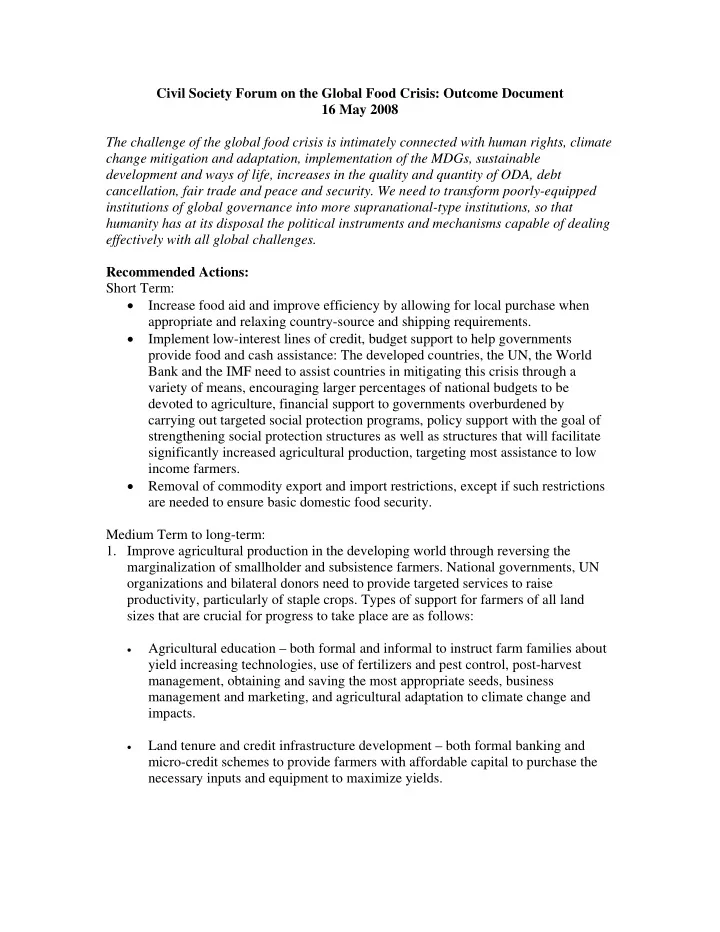

Civil Society Forum on the Global Food Crisis: Outcome Document 16 May 2008 The challenge of the global food crisis is intimately connected with human rights, climate change mitigation and adaptation, implementation of the MDGs, sustainable development and ways of life, increases in the quality and quantity of ODA, debt cancellation, fair trade and peace and security. We need to transform poorly-equipped institutions of global governance into more supranational-type institutions, so that humanity has at its disposal the political instruments and mechanisms capable of dealing effectively with all global challenges. Recommended Actions: Short Term: • Increase food aid and improve efficiency by allowing for local purchase when appropriate and relaxing country-source and shipping requirements. • Implement low-interest lines of credit, budget support to help governments provide food and cash assistance: The developed countries, the UN, the World Bank and the IMF need to assist countries in mitigating this crisis through a variety of means, encouraging larger percentages of national budgets to be devoted to agriculture, financial support to governments overburdened by carrying out targeted social protection programs, policy support with the goal of strengthening social protection structures as well as structures that will facilitate significantly increased agricultural production, targeting most assistance to low income farmers. • Removal of commodity export and import restrictions, except if such restrictions are needed to ensure basic domestic food security. Medium Term to long-term: 1. Improve agricultural production in the developing world through reversing the marginalization of smallholder and subsistence farmers. National governments, UN organizations and bilateral donors need to provide targeted services to raise productivity, particularly of staple crops. Types of support for farmers of all land sizes that are crucial for progress to take place are as follows: • Agricultural education – both formal and informal to instruct farm families about yield increasing technologies, use of fertilizers and pest control, post-harvest management, obtaining and saving the most appropriate seeds, business management and marketing, and agricultural adaptation to climate change and impacts. • Land tenure and credit infrastructure development – both formal banking and micro-credit schemes to provide farmers with affordable capital to purchase the necessary inputs and equipment to maximize yields.
Rural infrastructure development – in the form of better farm to market roads, • irrigation systems will go a long way in making it easier for farmers to utilize inputs but also enable them to get their crops to market. All these agricultural support mechanisms must be geared up to support farmers of entire nations particularly women and marginalized groups. Government services supplied to farmers in the developing world should be a human right. 2. Well thought through use of technologies: UN organizations should carefully consider the pros and cons of different technologies being proposed for increasing agricultural production. For instance, most genetically modified crops are best suited to large-scale, input-intensive mono-cropping schemes and are not designed to meet the needs of most small-scale farmers in the developing world. Other concerns with GM crops include increased herbicide use, herbicide-resistant weeds, higher prices for GM seeds, seed patents that promise to restrict or eliminate the traditional practice of seed-saving, and the GM seed-sterility technology known as Terminator. Technologies that are appropriate to the needs of small-scale farmers should be emphasized instead, including ecological and low-input farming practices. Biofuels have great potential to meet energy needs in a way that is climate friendly. As we move forward with this technology, we need to make sure that it does not come at the expense of the world’s food supply or poor people. Developed countries should reconsider plans for ethanol production in view of latest warnings raised on adverse impacts on food production and relatively low green-house gas reduction. 3. Fully engaging civil society: In developing national and global policy reforms, the UN, World Bank and IMF need to build formal, accountable, participatory and transparent structures that allow civil society to be fully and meaningfully engaged in the decision making process and implementation. Particular consideration should be given to grassroots associations including farmers’ cooperatives and other community based organizations, which can be important mechanisms for strengthening the voice of civil society. Many such institutions exist in developing countries but require further capacity building to strengthen their impact. 4. Fulfilling aid commitments to assist developing countries to achieve the Millennium Development Goals. Developed countries must decisively embrace MDG Goal 8 and provide, without further delay, the necessary funding to allow developing countries achieve the MDGs. 5. Dismantling trade distorting subsidies in developed countries and improving market access for developing country agricultural exports to spur sustainable agricultural production in developing countries. 2
6. Helping developing countries adapt to climate change: Work is urgently needed on agricultural and infrastructure adaptation to climate change, particularly in the poorer countries which will disproportionately suffer the effects. Climate change is contributing to the current crisis, and can be expected to have a greater effect in the future. 3
Recommend
More recommend